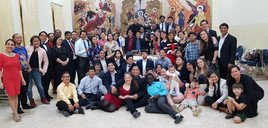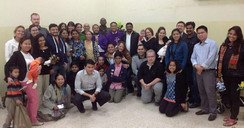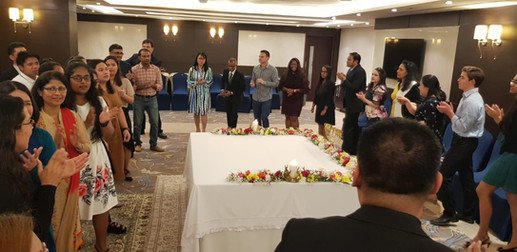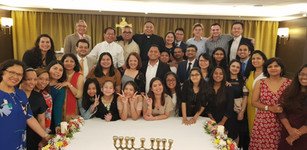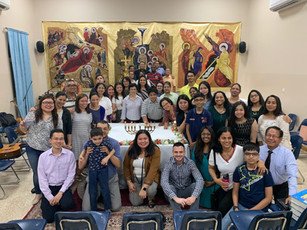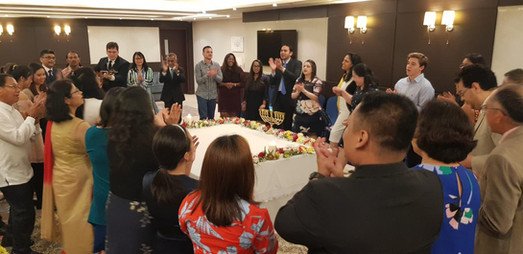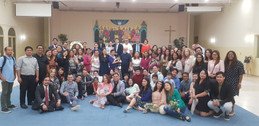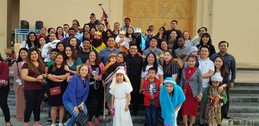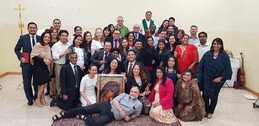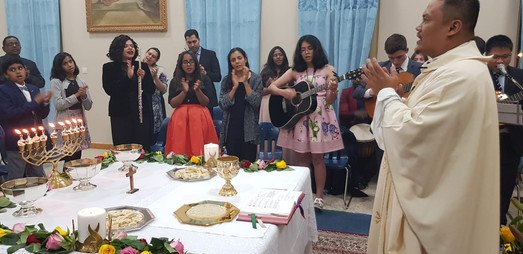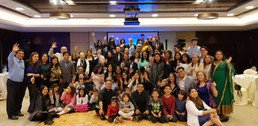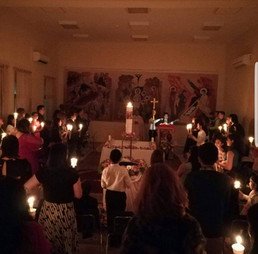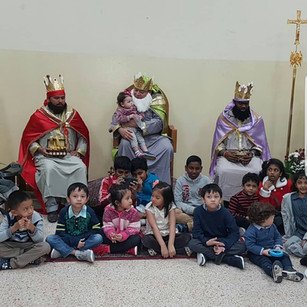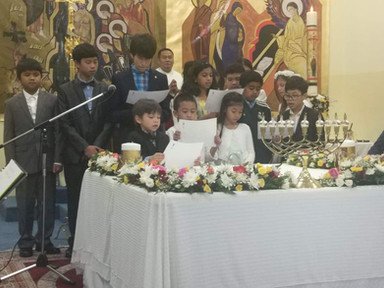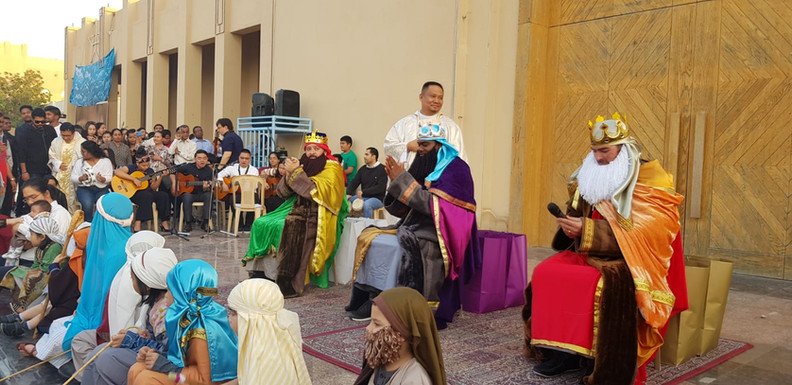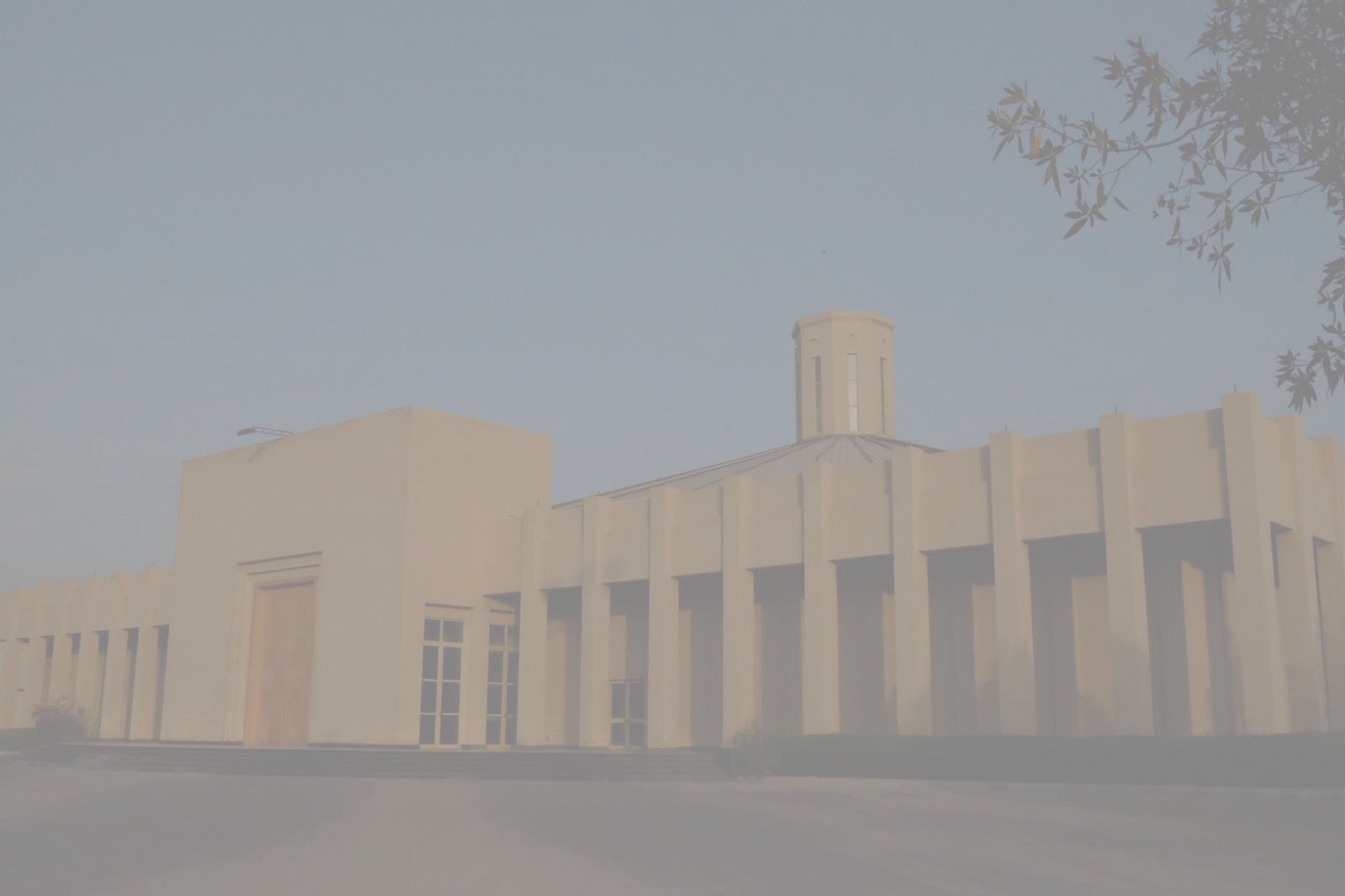
NEOCATECHUMENAL WAY
The Neocatechumenal Way, also known as the Neocatechumenate, NCW, colloquially The Way, is a charism within the Catholic Churchdedicated to Christian formation. It was formed in Madrid in 1964 by Kiko Argüello and Carmen Hernández.
Taking its inspiration from the catechumenate of the early Catholic Church by which converts from paganism were prepared for baptism, it provides post-baptismal formation to adults who are already members of the Church or to those far from the Church who have been attracted by the testimony of Christian life of love and unity in the communities (referencing such Bible verses as John 13:35 and 17:21), in accordance with the designs of the Rite of Christian Initiation of Adults (RCIA).Due to numerous vocations coming from the families formed in the communities, it has also helped to establish and run over 100 missionary diocesan seminaries in various locations. They are called "Redemptoris Mater" seminaries. It is responsible for communities of "families in mission", called "Missio ad gentes", living in many cities around the world. Together with a priest and his socius, and some celibate women, they make present the Church in places of little or no Catholic presence.




DECREE OF THE PONTIFICAL COUNCIL FOR THE LAITY: APPROVAL OF THE STATUTES OF NEOCATECHUMENAL WAY "AD EXPERIMENTUM"
The Neocatechumenal Way began in 1964 in the slums of Palomeras Altas, Madrid, through the work of Mr Francisco (Kiko) Argüello and Ms Carmen Hernández who, at the request of the poor with whom they were living, began to proclaim to them the Gospel of Jesus Christ. As time passed, this kerygma was embodied in a catechetical synthesis, founded on the tripod: "Word of God-Liturgy-Community", that seeks to lead people to fraternal communion and mature faith.
This new catechetical experience, born in the wake of the renewal inspired by the Second Vatican Council, attracted the keen interest of Archbishop Casimiro Morcillo, then Archbishop of Madrid, who encouraged the initiators of the Way to spread it to the parishes who asked for it. This experience of evangelization thus spread gradually through the Archdiocese of Madrid and to other Spanish dioceses.
In 1968, the initiators of the Neocatechumenal Way arrived in Rome and settled in the Borghetto Latino. With the permission of Cardinal Angelo Dell'Acqua, then Vicar General of His Holiness for the city and district of Rome, the first catechesis began in the parish of Our Lady of the Blessed Sacrament and the Canadian Martyrs. Since then, the Way has continued to spread to dioceses around the world and even to mission countries.
The Neocatechumenal Way is at the service of the bishops and parish priests as an itinerary for the rediscovery of Baptism and an ongoing education in the faith, offered to the faithful who want to revive in their lives the riches of Christian initiation by travelling this path of conversion and catechesis. As the Holy Father wrote, in this process an important help can be offered by "a post-baptismal catechesis in the form of the catechumenate by presenting again some elements from the "Rite of the Christian Initiation of Adults' with the purpose of allowing a person to grasp and live the immense and extraordinary richness and responsibility of the Baptism he has received" (Christifideles laici, n. 61).
The Way - whose itinerary is lived in parishes and in small communities made up of people of different ages and social conditions - has the ultimate goal of gradually bringing the faithful to intimacy with Jesus Christ, making them active subjects of the Church and credible witnesses of the Good News of our Saviour everywhere. The Neocatechumenal Way is also an instrument for the Christian initiation of adults who are preparing themselves to receive Baptism.
The actual practice of the Way follows the guidelines contained in the Catechetical Directory The Neocatechumenal Way, Guidelines for the teams of catechists (cf. Statutes, art. 2,2), subject to the joint approval of the Congregations for the Doctrine of the Faith, for the Clergy and for Divine Worship and the Discipline of the Sacraments.
At different times and in different ways, the Holy Father has addressed the Neocatechumenal Way in order to stress the abundant fruits of Gospel radicalism and the extraordinary missionary zeal that it brings to the life of the lay faithful, to families, to parish communities, and the wealth of vocations it inspires to the priestly and religious life, proving to be an "itinerary of Catholic formation, valid for our society and our time" (AAS 82 [1990] 1513-1515).
In the audience granted to the initiators and directors of the Neocatechumenal Way from around the world on 24 January 1997, on the occasion of the commemoration of the 30 years of life of the Way, the Holy Father expressly urged the drafting of the Statutes, "a very important step that will open the way to the formal juridical recognition by the Church, and giving you a further guarantee of the authenticity of your charism" (Address to the Neocatechumenal Way, 25 January 1997, p. 4; ORE, 5 February 1997, p. 9). From that moment, accompanied by the Pontifical Council for the Laity, the initiators began the process of elaborating a set of norms that would able to regulate the pratice and integration of the Neocatechumenal Way into the ecclesial framework.
On 5 April 2001, in an Autograph Letter addressed to Cardinal James Francis Stafford, President of the Pontifical Council for the Laity, the Supreme Pontiff, while repeating his request, reconfirmed this Council's competence to approve the Statutes of the Neocatechumenal Way and entrusted to its competence the future guidance of the Way (cf. Letter to Cardinal Francis Stafford, President of the Pontifical Council for the Laity, 5 April 2001; ORE, 2 May 2001, p. 5).
And so:
Taking into account the numerous spiritual fruits that the practice of the Neocatechumenal Way - whose existence has been accepted and appreciated in many local Churches for more than 30 years - has contributed to the new evangelization, and which have been reported to the Pontifical Council for the Laity by many letters of recommendation of Cardinals, Patriarchs and Bishops;
After careful examination of the text of the Statutes, the result of a laborious process of collaboration between the initiators of the Neocatechumenal Way and the Pontifical Council for the Laity, who made use of the contribution in their areas of specific competence offered by the different departments of the Roman Curia;
Taking note of the request sent to this Council on 5 April 2002, of Mr Francisco (Kiko) Argüello, Ms Carmen Hernández and Fr Mario Pezzi, members of the international leadership team of the Neocatechumenal Way, asking the Council to hasten the approval of the Statutes of the Neocatechumenal Way;
Relying on articles 131 and 133, 1 and 2, of the Apostolic Constitution Pastor Bonus on the Roman Curia, the Pontifical Council for the Laity
Decrees
the approval "ad experimentum" for a period of five years of the Statutes of the Neocatechumenal Way, as duly authenticated by the Council, of which a copy must be deposited in the archives of the Council. This is done with the confidence that the approved statutes offer firm and secure guidelines for the life of the Way and are an important aid for Pastors in their fatherly and careful accompaniment of the neocatechumenal communities.
Given in the Vatican on 29 June 2002, Solemnity of Sts Peter and Paul, Apostles, Patrons of the City of Rome.
James Francis Card. Stafford
President
StanisLaw RyLko
Secretary

COMMUNITIES


NCW qatar - 1st community
BORN:
NO. OF BROTHERS:




NCW qatar - 2ND community
BORN:
NO. OF BROTHERS:




NCW qatar - 3RD community
BORN:
NO. OF BROTHERS:
TRIPOD
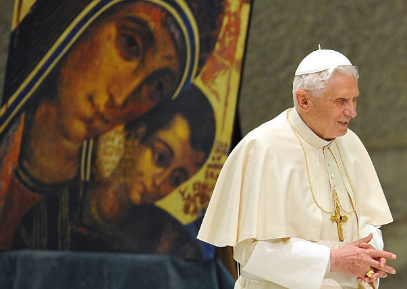

CELEBRATION OF THE WORD
Art. 11 [Weekly celebration of the Word]
§ 1. Every neocatechumenal community has a weekly celebration of the Word of God, usually with four readings, according to the themes indicated by the Orientations for the Teams of Catechists for each step.
§ 2. In the celebration of the Word of God, before the homily, the presbyter invites whoever wishes among those present to express briefly how the Word which has been proclaimed has spoken to his life. In the homily, which holds a privileged place in the instruction of the Neocatechumenate, the presbyter extends the proclamation of the Word, interpreting it according to the Magisterium and actualizing it in the “today” of the journey of faith of the neocatechumens.
§ 3. Each celebration of the Word is prepared with care, in turn, by a group of the community, with the help, whenever possible, of the presbyter. The group chooses the readings and the songs, prepares the monitions and arranges the room and the liturgical signs for the celebration, caring with zeal for its dignity and beauty.
§ 4. In order to enter more deeply into the Scriptures “with the mind and the heart of the Church”,the neocatechumens make use, above all, of the writings of the Fathers, of the documents of the Magisterium, specially the Catechism of the Catholic Church, and of works of spiritual writers.
Statute – Final Approved Text – June 2008

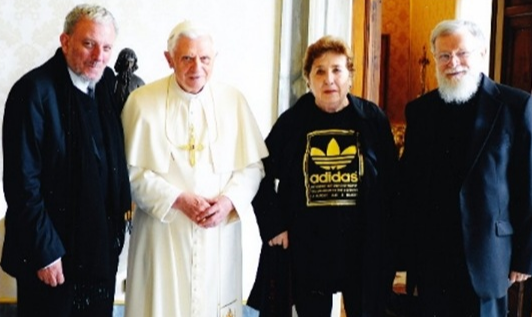
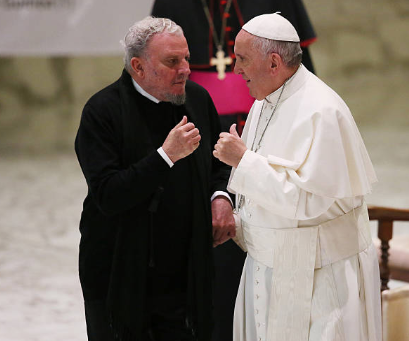

CELEBRATION OF THE EUCHARIST
Art. 13 [Eucharist]
§ 1. The Eucharist is essential to the Neocatechumenate, since this is a post-baptismal catechumenate lived in small communities. In fact, the Eucharist completes Christian initiation.
§ 2. The neocatechumens celebrate the Sunday Eucharist in the small community after the first Vespers of Sunday. This celebration takes place according to the dispositions of the diocesan bishop. The celebrations of the Eucharist of the neocatechumenal communities on Saturday evening are part of the Sunday liturgical pastoral work of the parish and are open also to other faithful.
§ 3. For the celebration of the Eucharist in the small communities the approved liturgical books of the Roman Rite are followed, with the exception of the explicit concessions from the Holy See. Regarding the distribution of Holy Communion under the two species, the neocatechumens receive it standing, remaining at their place.
§ 4. The celebration of the Eucharist in the small community is prepared under the guidance of the presbyter, by a group of the neocatechumenal community, in turn, which prepares brief monitions to the readings, chooses the songs, provides the bread, the wine, the flowers, and takes care of the decorum and dignity of the liturgical signs.
Statute – Final Approved Text – June 2008
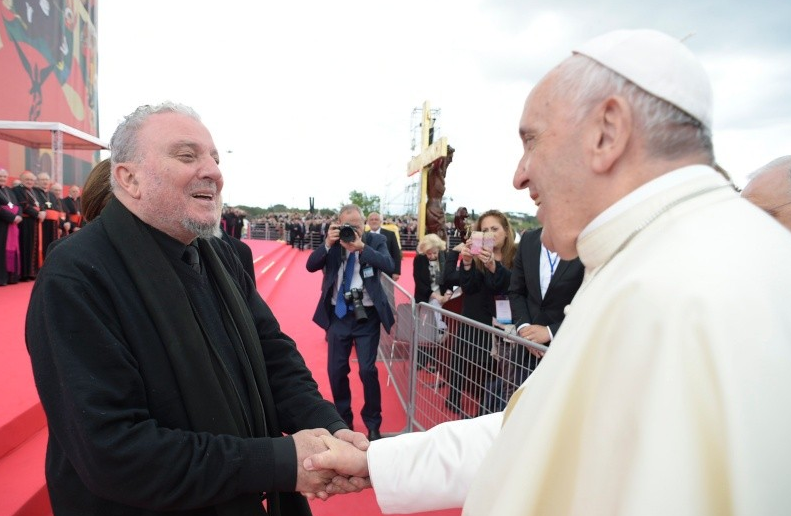

CONVIVENCE
Section 3 Community Art. 15 [Communitarian aspect and convivence]
§ 1. Education in community life is one of the fundamental tasks of Christian initiation. The Neocatechumenate nurtures people in community life in a gradual and constant way by inserting them in a small community, open to the life of the parish community and of the whole Church.
§ 2. A special moment of this education is the monthly day of convivence of every neocatechumenal community. In the convivence, after the celebration of Lauds, people share their experience of what God’s grace is accomplishing in their life and any difficulties which may have occurred are expressed, respecting the freedom of a person’s conscience. This fosters knowledge and reciprocal enlightenment and mutual encouragement in seeing God’s action in each person’s history.
§ 3. The community helps the neocatechumens to discover their need for conversion and maturation in faith: differences, defects and weaknesses show clearly the incapacity to love the other as he is, destroy false ideals of community and provide the experience that communion (koinonia) is the work of the Holy Spirit.
Statute – Final Approved Text – June 2008
PILGRIMAGE & EVENTS




Pope sends out Neocatechumenal Way on mission
GALLERY

